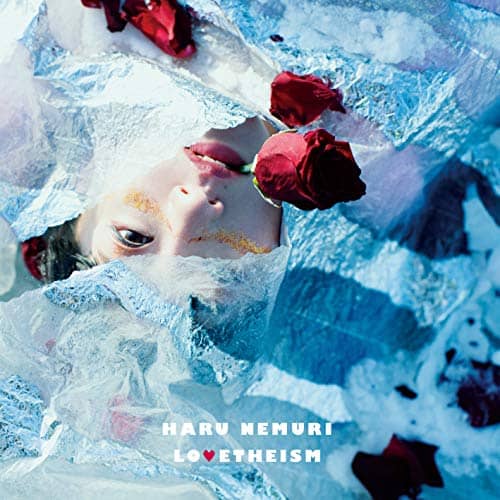Born and raised in Yokohama, Japan, Haru Nemuri has been making noise around the Japanese music scene since her first project, “Sayonara, Youthphobia” dropped in 2016. It was only when she released her 2018 ‘official' debut, “Haru to Shura” that she started to attract some well-deserved momentum internationally, thanks in large to Anthony Fantano AKA Theneedledrop's sterling, yellow flannel'd review. Drawing acclaim for her seamless fusion of rap, spoken word, electronica, J-pop, and rock, as well as her frenetic vocal delivery and performance style – her live show is like watching an exorcism take place on stage – anticipation for Nemuri's 2020 follow-up skyrocketed. Also billed as a mini-album, “Lovetheism” clocks in at a swift 7 songs and 25 minutes. Short, yes, but make no mistake, Nemuri wastes no time on pleasantries – she's here to blow the house down.
Buy This Title
The first sounds we hear on “Lovetheism” are the commanding, victorious booms of fanfare trumpets. Traditionally, this signifies a grand entrance, a ceremonial declaration by a supreme presence – usually royalty – that demands to be heard; considering the name of the track itself is “Fanfare”, it's clear Nemuri has no intention of being the exception to the rule. The trumpets are replaced by an epic, looping guitar riff that sounds like a warning of Ragnarök yet to come. Nemuri appears, her vocal pacing erratic, taking audible deep breaths between verses as she waxes poetic about love, anger, the spirit, the self.
If it's your first time listening to Nemuri, this triumphant opener tells you everything you need to know. Throughout the album, her vocal delivery morphs from euphoria, to meditation, to one-woman angry mob, to straight-up rock goddess. Despite her voice not being the strongest in a technical sense, it's still her greatest tool, and she twists and stretches it to its limit, transitioning from a schoolgirl's whisper to a woman possessed, screaming until you can hear her voice collapse in exhaustion. There's a popular proverb commonly used inside the sphere of musical theatre: “When the emotion becomes too strong for speech, you sing; and when it becomes too strong for song, you dance.” Disclaimer: Haru Nemuri's “Lovetheism” is no musical, nor is it inspired by. However, in an odd way, Nemuri unknowingly spins her own version of this technique, building such emotional catharsis with her vocals that when her range reaches a breaking point, the instrumental takes the reigns and catapults the song into a final, glorious crescendo.
The best example of this is on “Trust Nothing But Love”, the electrifying and exorcising follow-up to the album's foreboding opening track; If “Fanfare” is the announcement, “Trust Nothing But Love” is Nemuri's divine deliverance, taking the very best of her musical sensibilities and squeezing them into four and a half minutes of throat-shredding ecstasy. A protest song at heart, she belts “everything is your world, everything is my world” with empowering but frustrated urgency that reflects the turbulence of the world in 2020.
“Lovetheism” is sprinkled throughout with these bite-sized mantras that guide Nemuri's worldview, often performing them in English, perhaps to spread the gospel across borders: On “Pink Unicorn”, another standout from the album, she chants “feel or die, think or die” while on the titular track, “Lovetheism”, she repeats – surprise, surprise – “Love The Ism”. While the latter may be on the nose, the rest of the track is written and delivered earnestly enough to stop it from being just another hollow song about how love is the answer to the world's problems. Nemuri's idea of love isn't instantaneous, nor something to be acquired, but rather something to strive for. She's not forcing love down our throats, but simply reminding us of its power as an affirmation. Other standouts include “Riot”, a beautifully written, spoken word ode to life and the act of living, and “Be Your Ocean”, a downbeat, grimy track that threatens to drown itself in melancholy but ultimately stays afloat.
Haru Nemuri's “Lovetheism” is a short but sweet project that showcases the versatility and vibrance of her artistry. Backed by noisy, maximalist instrumentals, she makes the most of her limited runtime by injecting her soul into the vocal performances. The only downside is that she never manages to top the glowing three-track run that opens the album, ultimately leaving the listener just slightly underwhelmed and wanting. However, as a teaser for bigger things to come, she's certainly whetted the appetite and raised the bar for herself. Sound the trumpets – Haru Nemuri isn't finished with us yet.
















